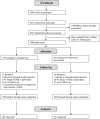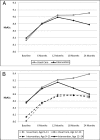Clinic-integrated behavioral intervention for families of youth with type 1 diabetes: randomized clinical trial
- PMID: 22392172
- PMCID: PMC3313642
- DOI: 10.1542/peds.2011-2858
Clinic-integrated behavioral intervention for families of youth with type 1 diabetes: randomized clinical trial
Abstract
Objective: To test the effect on diabetes management outcomes of a low-intensity, clinic-integrated behavioral intervention for families of youth with type 1 diabetes.
Methods: Families (n = 390) obtaining care for type 1 diabetes participated in a 2-year randomized clinical trial of a clinic-integrated behavioral intervention designed to improve family diabetes management practices. Measurement of hemoglobin A1c, the primary outcome, was obtained at each clinic visit and analyzed centrally. Blood glucose meter data were downloaded at each visit. Adherence was assessed by using a semistructured interview at baseline, mid-study, and follow-up. Analyses included 2-sample t tests at predefined time intervals and mixed-effect linear-quadratic models to assess for difference in change in outcomes across the study duration.
Results: A significant overall intervention effect on change in glycemic control from baseline was observed at the 24-month interval (P = .03). The mixed-effect model showed a significant intervention by age interaction (P < .001). Among participants aged 12 to 14, a significant effect on glycemic control was observed (P = .009 for change from baseline to 24-month interval; P = .035 for mixed-effect model across study duration), but there was no effect among those aged 9 to 11. There was no intervention effect on child or parent report of adherence; however, associations of change in adherence with change in glycemic control were weak.
Conclusions: This clinic-integrated behavioral intervention was effective in preventing the deterioration in glycemic control evident during adolescence, offering a potential model for integrating medical and behavioral sciences in clinical care.
Trial registration: ClinicalTrials.gov NCT00273286.
Figures
Comment in
-
Swim speed, behavior, and movement of North Atlantic right whales (Eubalaena glacialis) in coastal waters of northeastern Florida, USA.PLoS One. 2013;8(1):e54340. doi: 10.1371/journal.pone.0054340. Epub 2013 Jan 10. PLoS One. 2013. PMID: 23326603 Free PMC article.
-
Response to 'Early view: an opportunity for enhanced peer review'.Diabet Med. 2017 Jul;34(7):1011-1012. doi: 10.1111/dme.13353. Diabet Med. 2017. PMID: 28326603 Free PMC article. No abstract available.
References
-
- Glasgow RE, Wagner EH, Kaplan RM, Vinicor F, Smith L, Norman J. If diabetes is a public health problem, why not treat it as one? A population-based approach to chronic illness. Ann Behav Med. 1999;21(2):159–170 - PubMed
-
- Glasgow RE, Hiss RG, Anderson RM, et al. . Report of the health care delivery work group: behavioral research related to the establishment of a chronic disease model for diabetes care. Diabetes Care. 2001;24(1):124–130 - PubMed
-
- Amiel SA, Sherwin RS, Simonson DC, Lauritano AA, Tamborlane WV. Impaired insulin action in puberty: a contributing factor to poor glycemic control in adolescents with diabetes. N Engl J Med. 1986;315(4):215–219 - PubMed
-
- Susman-Stillman A, Hyson DM, Anderson FS, Collins WA. Adolescent psychosocial development and adherence to treatment for insulin-dependent diabetes mellitus. In: McNamara JA, Jr, Trotman CA, eds. Creating the Compliant Patient. Ann Arbor, MI: Center for Human Growth and Development. The University of Michigan; 1997:73–101
Publication types
MeSH terms
Substances
Associated data
Grants and funding
LinkOut - more resources
Full Text Sources
Medical



